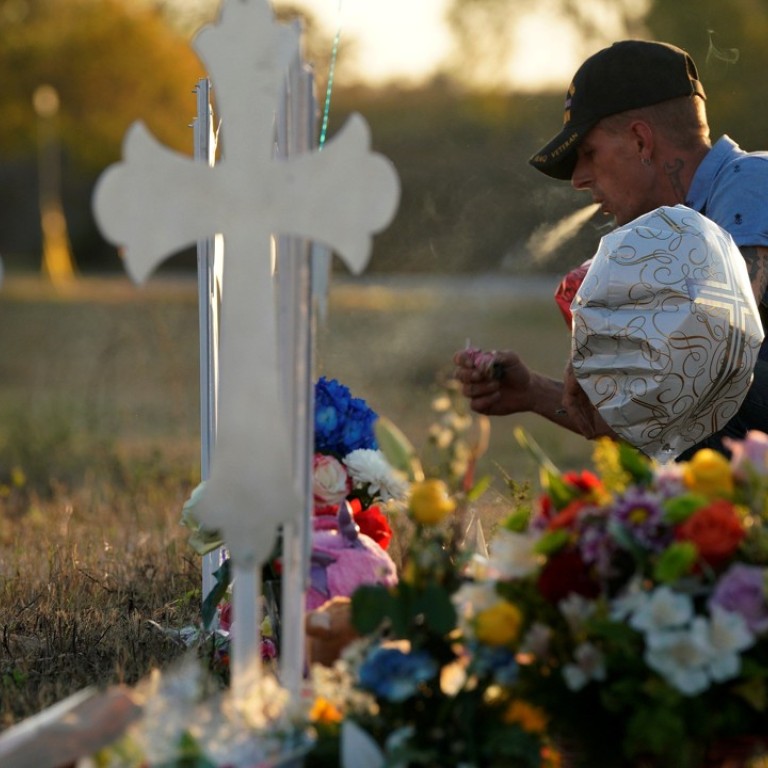
‘A gun stopped him’: despite latest mass shooting, residents of Texas town remain divided on dangers of firearms
The church shooting came just five weeks after a gunman mowed down 58 concertgoers in Las Vegas, in the deadliest mass shooting in modern American history
Raw with grief over the killing of several of his friends, Robert Kunz has no time for the argument that the latest mass shooting means America’s gun culture must change.
“A gun didn’t kill those people. Didn’t kill my friends,” the 50-year-old said, standing across the street from the church where a gunman shot dead 26 parishioners including an unborn child in the tiny community of Sutherland Springs.
What’s more, he emphasised, “a gun stopped him … Not a cop gun. A civilian.”
Kunz is among the many local residents hailing Stephen Willeford, 55, who fired at the gunman with his own AR-15 assault rifle – shooting and wounding him as he emerged from the church.
It’s a view echoed by US President Donald Trump, who said if the “very brave” Willeford had not been armed, “instead of having 26 dead, you would have had hundreds more dead.”
Stricter background checks, Trump suggested, would have made “no difference” in averting the tragedy.
The latest gun massacre to strike the US has reignited the nation’s fraught debate over gun control, with many Democrats calling to tighten regulations and The New York Times editorial board emphasising that “this is the time” for a legislative response to recurring fatal shootings.
Evangelina Santos, whose brother died in the attack, told CNN through tears that enough was enough: “no more guns”.
I carry a gun with me all the time, and I’m glad that I do when stuff like this happens
Still, in this rural area, where the ethos of small government and community self-reliance is ingrained in daily life, many working through the tragedy’s aftermath remain unwavering that gun control will do little to the violence.
“Government isn’t here to do everything for us,” said volunteer paramedic Paul Brunner, who witnessed the brutality first-hand as one of the first rescuers to arrive at the scene.
Gun ownership has long been a part of the culture, explained residents, who say the firearms violence that has long afflicted US urban areas – and now has taken a heavy toll in this rural community – is new to them.
Stephanie Perkovich, who taught her nine-year-old son and 15-year-old daughter how to safely handle firearms, said the shooting was evidence that gun ownership was necessary.
“I’m a very proud owner of guns,” she said. “I carry a gun with me all the time, and I’m glad that I do when stuff like this happens.”
The church shooting came just five weeks after a gunman mowed down 58 concertgoers in Las Vegas, in the deadliest mass shooting in modern American history.
The frequency of the attacks raises tough questions for Nathan Carrizales, a volunteer aiding victims’ families as they prepared funerals.
“It’s a very sensitive topic,” the 22-year-old said. “It just opens my eyes on what the different possibilities are for us to move forward to make sure this doesn’t happen again.”
Likewise Donna Watkins, visiting from the coastal Texas city of Corpus Christi, who is grandmother to a child of similar age as the youngest victim of Sunday’s massacre, a baby of 18 months.
“People are just able to get these guns more freely and there should be more … regulations and laws against guns,” she said.
But such views appeared to be in the minority here.
For Pastor Scott Talibert, whose church is in Lolita, a small Texas community two hours from Sutherland Springs, the problem lies squarely with human behaviour.
“Are guns dangerous? Yes. Are cars dangerous?” he asked rhetorically. “Yes.”

.png?itok=arIb17P0)